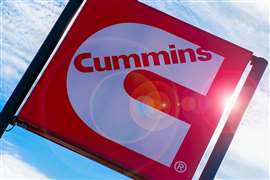Read this article in Français Deutsch Italiano Português Español
Beyond the pilot phase: Circulor urges OEMs to act on battery passports
30 July 2025
Last summer, Volvo Cars announced the launch of the first commercially available battery passport — the result of a partnership with UK-based Circulor, which uses blockchain technology to map supply chains. It put Volvo ahead of the curve in complying with the forthcoming EU Regulation 2023/1542 that will require digital battery passports for a variety of rechargeable batteries from Feb. 18, 2027.
 The Hyundai HX19e mini excavator comes with a 32kWh battery pack. (Photo: Hyundai)
The Hyundai HX19e mini excavator comes with a 32kWh battery pack. (Photo: Hyundai)
According to Circulor, the EU battery regulation stipulates 84 data attributes that must be addressed.
Originally, the regulation required OEMs and battery makers to meet an August 2025 milestone: to begin tracking and documenting the provenance of battery materials and quantify carbon emissions. However, the EU has postponed that date, with a new start date to be discussed in the fall.
Begin Work Now
Nonetheless, the tech company said OEMs should be working on compliance now. While pilots are still being completed, the industry should consider itself past such a stage. It should be taking action now to prepare for introducing battery passports on a production scale.
It appears Volvo Cars is continuing to exemplify this approach. The company was the first to bring battery passports for its EX90 fully electric SUV being sold in U.S. and EU markets. According to Circulor, Volvo also plans to roll out battery passports this year for their ES90 electric automobile.
Pilot to Production
Circulor was one of several digital solution companies that participated in the 2024 Global Battery Alliance (GBA) battery passport pilot program. The goal: to collect, verify and score real-world sustainability data across the battery supply chain.
From the GBA’s earliest days, the company has been affiliated with the organization as a traceability and battery passport solution provider. The company felt it important to be part of that ecosystem and share its learnings.
Circulor also conducted a pilot for BYD subsidiary FinDreams Battery, which it said started the company’s engagement regarding battery passports as well as supply chain traceability data.
Avoiding Global Fragmentation
 Komatsu’s WX04B electric load-haul-dump (LHD) machine. (Photo: Norcat)
Komatsu’s WX04B electric load-haul-dump (LHD) machine. (Photo: Norcat)
While the EU regulation is leading the way, a pressing concern is how to avoid a patchwork of requirements for battery traceability and digital passports around the world. Circulor sees no value in industry having to address regulations across multiple markets, such as the EU, the U.S., Japan, etc.
To mitigate this, the company said it has been working closely with policymakers on both sides of the Atlantic, particularly the EU and U.S. The company has made efforts to facilitate working-level conversations among policymakers to ensure they are aligning their requirements for traceability and battery passports.
The overarching goal, Circulor said, is global harmonization — for the sake of both regulatory clarity and operational efficiency.
Protecting Sensitive Data
Another concern for battery makers and OEMs is the sharing of confidential information. According to Circulor, that’s a key reason why companies should use a supply chain traceability firm — a neutral third party — to manage the data and ensure its appropriate release.
What the company said it can do is something called selective disclosure, where the data attributes themselves are hidden, but their presence in the passport is indicated with a check mark or other symbol. It’s an important approach to maintaining the confidentiality of commercially sensitive data, the company said, while still adhering to the requirements of the regulation.
Who Sees What
 Liebherr and Fortescue jointly developed an autonomous battery-electric T 264 truck, seen here at MinExpo International in Las Vegas in 2024. (Photo: Chad Elmore)
Liebherr and Fortescue jointly developed an autonomous battery-electric T 264 truck, seen here at MinExpo International in Las Vegas in 2024. (Photo: Chad Elmore)
The next key step, Circulor said, will be sharing battery passports with different groups of stakeholders. At present, these stakeholder groups include regulators, consumers/owners and a group defined as “parties with legitimate interests.” That last group can include organizations such as battery recyclers and refurbishers, but the company added that legislation in the EU is attempting to more specifically define what such interested parties would be.
This would ensure that the credentials such parties have for accessing data have been verified, given the restricted nature of the data. Furthermore, it would give OEMs a comfort level that any sensitive data is not being accessed by anyone without a legitimate need. The company added that such an approach would be crucial for earning industry support for battery passports and the process for accessing data.
A Strategic Initiative
While the regulatory timelines may continue to shift, Circulor said the groundwork for compliance remains substantial, which is why the company is calling for those affected to begin work now, if they have not done so already.
It described the process of tracing supply chains as an activity that doesn’t occur overnight. Additionally, companies should avoid viewing it as a project that can be handled by a single department, such as IT. According to Circulor, the process of complying with the regulation will require a strategic personnel investment. This will include leads from sustainability, technology, operations and product teams.
POWER SOURCING GUIDE
The trusted reference and buyer’s guide for 83 years
The original “desktop search engine,” guiding nearly 10,000 users in more than 90 countries it is the primary reference for specifications and details on all the components that go into engine systems.
Visit Now
STAY CONNECTED




Receive the information you need when you need it through our world-leading magazines, newsletters and daily briefings.
CONNECT WITH THE TEAM













